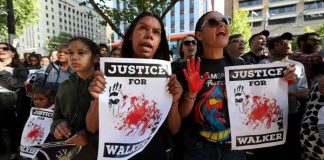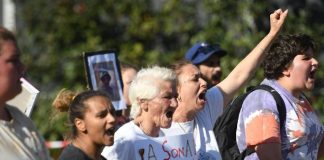In official US history, the civil rights movement has been emptied it of its radical content.
Martin Luther King now gets a national holiday and is celebrated for non-violence and brilliant oratory, often by the same political forces that were trying to undermine him in the 1950s and 1960s. The implication is that the era of struggle is over, that in a post-racial USA, racism is a matter of individual racists, or worse, of blacks themselves creating their own problems.
But the official history has been shaken by the shooting murder of an unarmed teenager, Mike Brown, in Ferguson, Missouri, in 2014, and the subsequent emergence of the Black Lives Matter movement protesting systematic killing and harassment.
That’s the context in which Selma arrives. Though it’s primarily an historical account of the struggle for the right to vote, there are clear allusions to today’s events in the scenes of police violence. The theme song Glory includes the lyrics, “that’s why Rosa sat on the back of the bus / that’s why we marched in Ferguson with our hands up”.
The actors attended the premiere wearing t-shirts saying, “I can’t breathe”—the last words of Eric Garner, a black man strangled to death by a police officer in New York City, accused of selling single cigarettes. Garner’s death, and the failure to charge the officer responsible, helped spread the Black Lives Matter movement from Ferguson to the whole USA.
The struggle in Selma, a small town in the state of Alabama, was focused on winning a federal law against restrictions used by the former slave states of the South to prevent blacks from exercising their right to vote.
Selma shows the determined, successful protest against a vicious establishment. To the displeasure of many Democrat supporters, the film exposes the real role Democratic President Lyndon Johnson (LBJ) played, only introducing the Voting Rights Act of 1965 as pragmatic response to escalating protest, rather than an act of principle.
Selma ends, in some ways, where today’s story begins—with the passing of the Voting Rights Act, one year after the Civil Rights Act of 1964 that formally ended segregation in the South.
But the attainment of formal legal equality was not the movement’s conclusion. Many black activists radicalised in the years following, and began to see that the continuing black poverty and inequality had its roots in the capitalist system.
In the 1960s, blacks in the North did not experience formal segregation laws and had the right to vote. Yet they still lived in segregated ghettos. Four days after the Voting Rights Act passed the biggest black riots the United States had ever seen broke out in Watts, in Los Angeles.
King
Martin Luther King is shown wrestling with these issues in Selma, when he asks a fellow leader while inside a jail cell, “what’s the point of fighting for the right of a man to sit at a lunch counter if he can’t afford to buy the burger?” In the years following, King began to campaign for the redistribution of wealth and supported workers’ struggles.
Ultimately, King’s dilemma remains unsolved. As a result of the civil rights’ movement, a small layer of blacks have been able to succeed in official politics or the corporate world. But it’s a different story for the vast majority. The average black household makes 61.4 per cent of what a white household makes, black mothers have double the mortality rates of whites, and every 28 hours, a black person is shot by police, law enforcement or a vigilante.
No election can reverse this oppression—part of the reason why the voter turn-out rate, particularly of blacks, has been so low in the United States. Yet even voting rights are under attack. Some of parts of the Voting Rights Act were recently reversed by the Supreme Court.
America has its first black President, and yet he consistently offers excuses for a racist system. Speaking in Selma to commemorate the 50-year anniversary Obama said, “Just this week, I was asked whether I thought the Department of Justice’s Ferguson report shows that, with respect to race, little has changed in this country … But I rejected the notion that nothing’s changed. What happened in Ferguson may not be unique, but it’s no longer endemic, or sanctioned by law and custom; and before the Civil Rights Movement, it most surely was.”
But young blacks and their supporters standing up across the US are doing so precisely because of the endemic nature of racism. They are confronting the same dilemma King grappled with inside his Alabama prison cell in Selma. They, and not black politicians like Obama, are the force that can solve it.
By Amy Thomas
Selma
Directed by Ava DuVernay
In cinemas now






